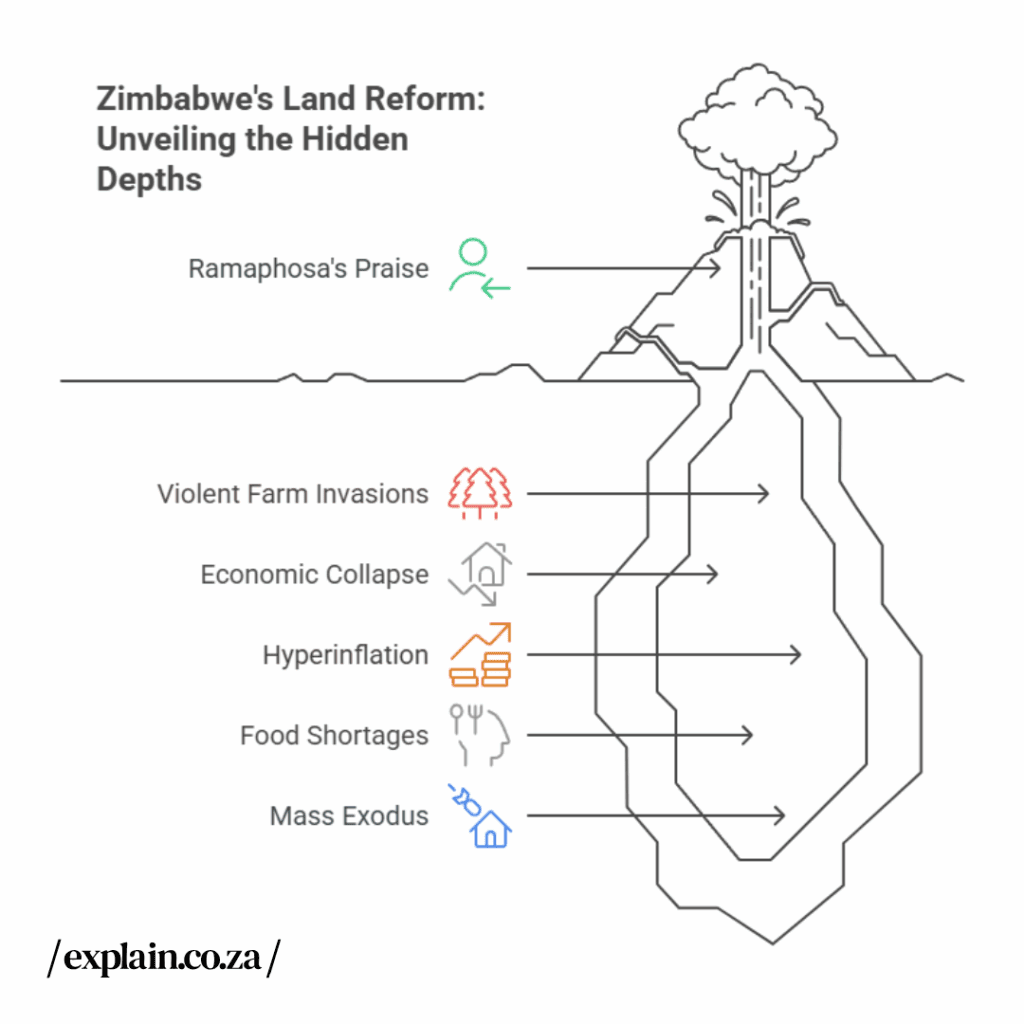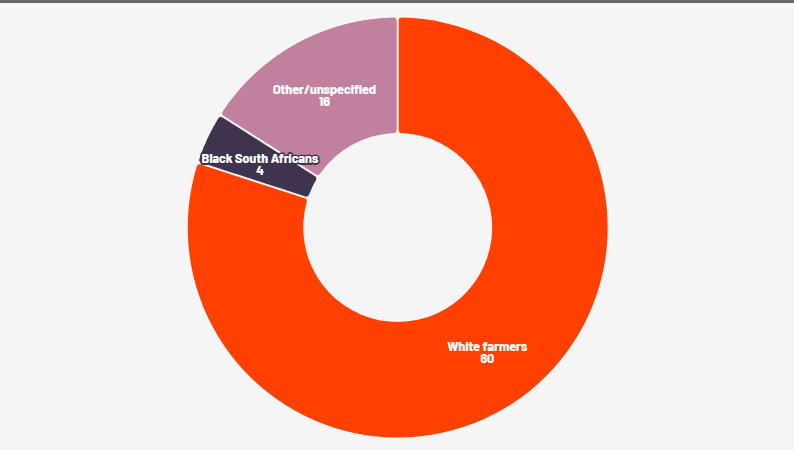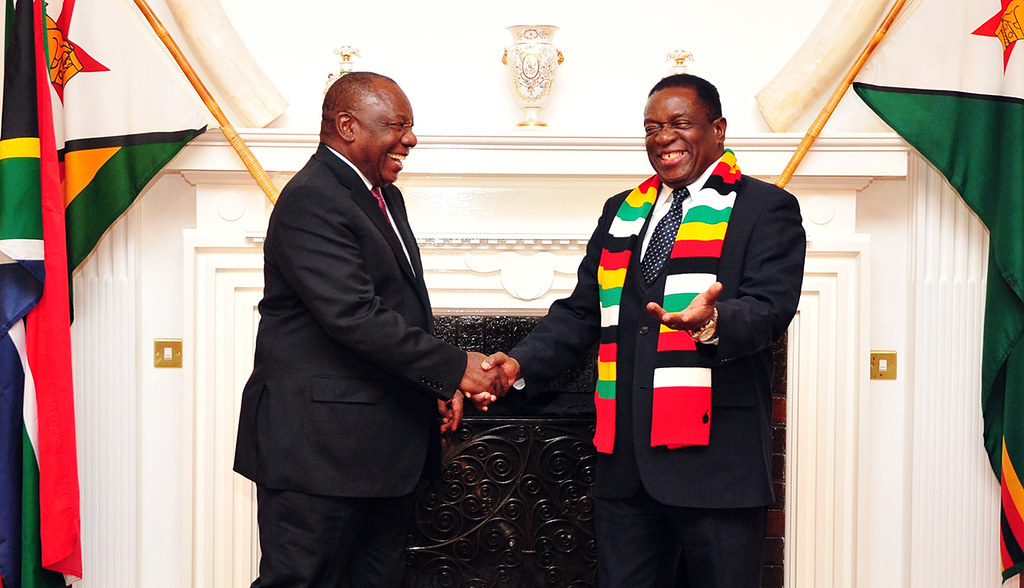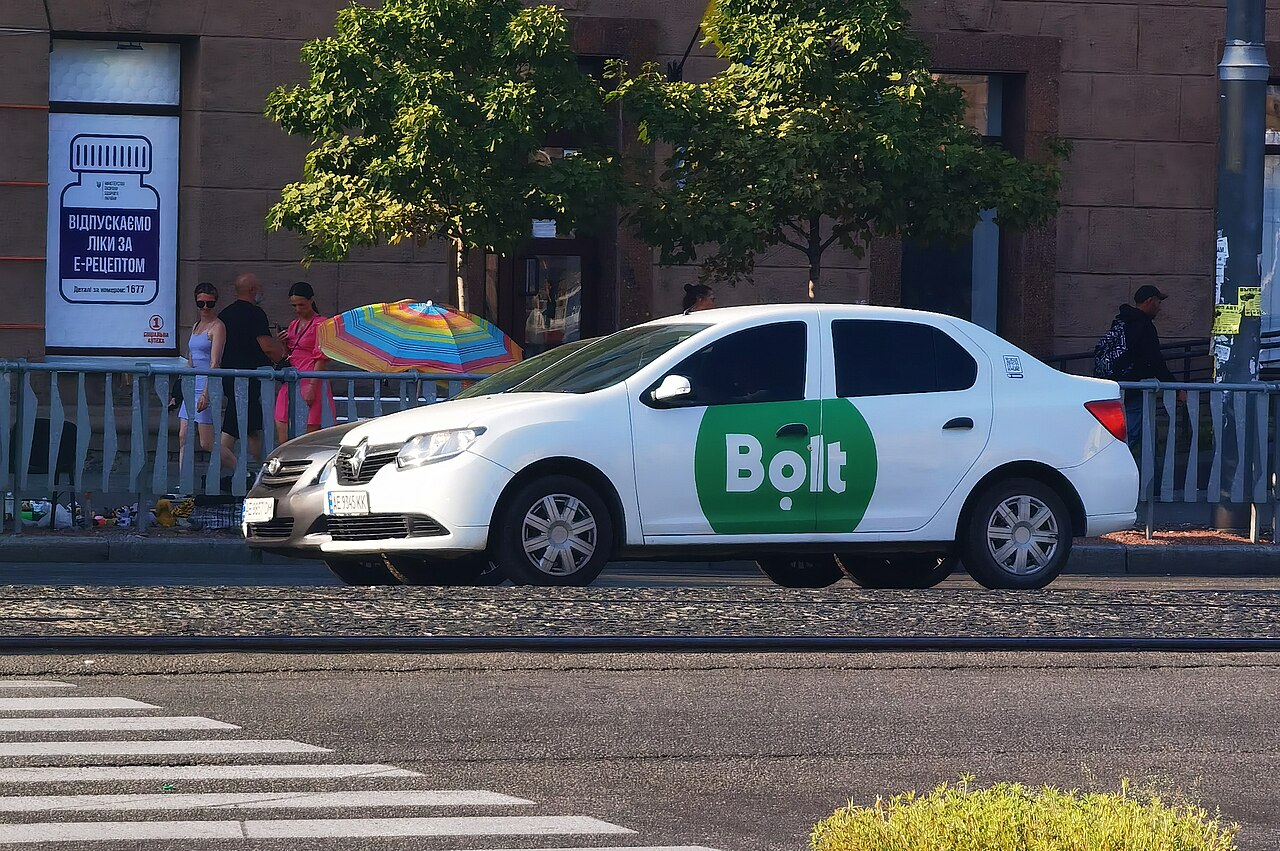Alright, let’s talk about Ramaphosa’s latest kerfuffle in Zimbabwe.
What sounded like routine diplomacy in Harare — praising Zimbabwe’s land reforms — exploded into a political and economic storm back home.
Why’s everyone freaking out? Because praising Zimbabwe’s land reform isn’t just a diplomatic slip, it risks scaring off investors, rattling farmers, and fuelling political rivals back home.

What did Ramaphosa say?
In his speech at the Zimbabwe Agricultural Show on 29 August, Ramaphosa painted a rosy picture of Zimbabwe’s post-independence land reforms.
He noted that, like South Africa, Zimbabwe inherited a colonial mess where most productive farmland was owned by a white minority, while the black majority was shoved onto marginal communal lands.
“It was therefore essential – for both historical redress and food security, development and economic growth – that the government embarked on ambitious reforms to facilitate the entry of black Zimbabweans into productive agriculture, including support to small-scale farmers,” he declared.
On the face of it, he’s drawing a favourable parallel to South Africa’s own land challenges, suggesting Zimbabwe’s bold moves were a necessary step that mirrors our push for transformation.
It’s the kind of solidarity talk you’d expect in regional diplomacy, right? But here’s where it gets dicey.
What were the issues with Zimbabwe’s land reform?
Those “ambitious reforms” Ramaphosa praised? They’re the Fast Track Land Reform Programme under Robert Mugabe, which kicked off in 2000 and involved violent farm invasions by war veterans and Zanu-PF loyalists.
About 6,000 white-owned farms were seized without pay, often violently. Murders, chaos, no due process. International sanctions followed. And Zimbabwe’s economy nosedived.
The economy tanked spectacularly: agriculture collapsed, hyperinflation hit 89 sextillion percent in 2008 (Yes, sextillion. We had to Google it too), food shortages, famine for millions, and a mass exodus—roughly a quarter of the population fled.
Tobacco production plummeted, exports dried up, and Zimbabwe became a pariah state, still owing billions in reparations to ousted farmers.
Today, tobacco has bounced back a little. But Zimbabwe still owes billions in reparations and has never truly recovered. As the Democratic Alliance (DA) put it in their scathing response to Ramaphosa’s comments: the whole thing “left Zimbabwe in tatters”.

Visual by Kajal Premnath.
Why South Africa looks favourably different — and why that matters
Ramaphosa’s nod to similarities—colonial dispossession, racial imbalances—rings true on a historical level.
In SA, some figures suggest that white farmers still hold close to 80% of private farmland despite being just 8% of the population, while black South Africans own a measly 4%. But our approach couldn’t be more night-and-day.

Visual by Kajal Premnath.
South Africa’s land reform is constitutionally driven, emphasising willing-buyer-willing-seller deals where possible, with the new Expropriation Act of 2025 allowing for “nil compensation” only in specific public-interest cases, like abandoned land.
It’s meant to be lawful, transparent, and geared towards economic viability, not political patronage. Zimbabwe was a free-for-all: farms went to Zanu-PF cronies without skills, training, or support, leading to underutilisation and collapse.
South Africa, by contrast, sticks to market-based principles to avoid that pitfall, buying land on the open market and focusing on restitution that builds food security.
Why Ramaphosa’s comments caused a stir
Now, enter the unforced error bit—this was a classic own-goal for Ramaphosa, and it’s already spooking investors. Coming right after the Expropriation Act was passed amid coalition tensions, his praise feels like a green light for radical expropriation without compensation, even though the GNU explicitly rejects the Zimbabwe model.
The DA, Ramaphosa’s key coalition partner, slammed it as an attempt to “whitewash the disaster in Zimbabwe, to create momentum for the ANC’s land expropriation agenda.” Right-wing groups like the Freedom Front Plus went further, accusing him of signalling that “famine and mass emigration are entirely acceptable, provided they help redress historical imbalances.”
The FW de Klerk Foundation echoed this, warning: “Don’t copy Zimbabwe,” highlighting how it would jeopardise property rights—the bedrock of SA agriculture, where land is collateral for 50% of GDP in farm debt.
Investor nerves are frayed; foreign direct investment in agribusiness could dip if this narrative sticks, especially with US President Donald Trump already eyeing Afrikaner farmers for refugee status over perceived discrimination. It’s not just talk—it’s eroding confidence in a fragile economy.
Why would Ramaphosa say that?
According to Piers Pigou, an independent consultant on international relations and security, who spoke to explain, this wasn’t some rogue outburst but part of a decades-long tradition of ANC clumsiness on the Zimbabwe file.

He points to the Mbeki years and their infamous “controversial quiet diplomacy,” which essentially let Mugabe’s regime off the hook while the world watched in horror.
Of course, the right-wing has latched on like limpets, using this to stoke fears of a Zimbabwe-style apocalypse in SA.
What is the nature of Ramaphosa’s diplomacy?
Pigou sees it as part of that “wider trajectory” of awkward ANC-Zimbabwe dynamics—less a masterstroke, more a habitual slip — an attempt at regional solidarity that lacks sufficient nuance.
He says the statement “could have been avoided” and that Ramaphosa missed an opportunity to frame the lessons of Zimbabwe in terms that promote rule of law and compensation — points that would have reassured both domestic critics and international investors.
Put differently: diplomacy is about message management.
A leader can acknowledge historical justice while also stressing constitutional process and safeguards. Ramaphosa’s framing handed opponents an easy headline and shook market confidence.
What’s the bottom line?
Ramaphosa’s comments were interpreted as tone-deaf and ill-timed because they seemed to praise a model widely blamed for economic collapse.
South Africa’s land debate is real and urgent, but its path matters: the law, institutional safeguards and measured implementation differentiate SA from Zimbabwe.
As Piers Pigou put it, the president’s words were “clumsy” and “largely irresponsible” given “the litany of illegalities” and unresolved legacies in Zimbabwe, and that tone alone has real diplomatic and economic consequences.
Emma is a freshly graduated Journalist from Stellenbosch University, who also holds an Honours in history. She joined the explain team, eager to provide thorough and truthful information and connect with her generation.




